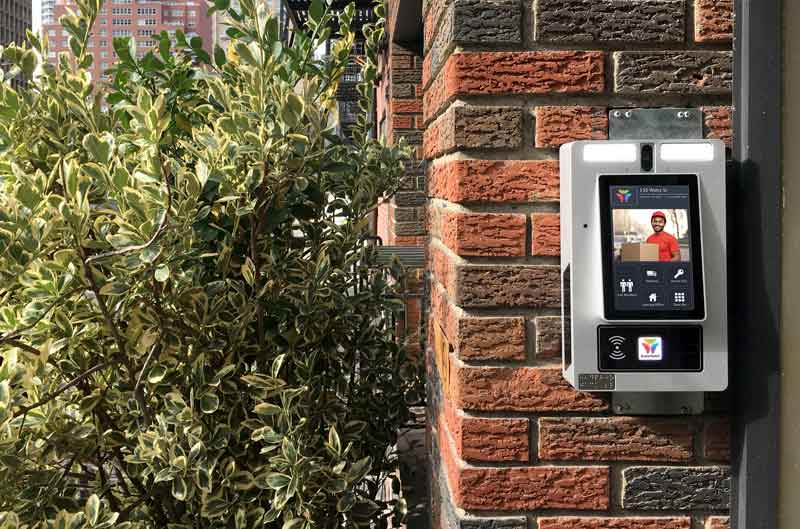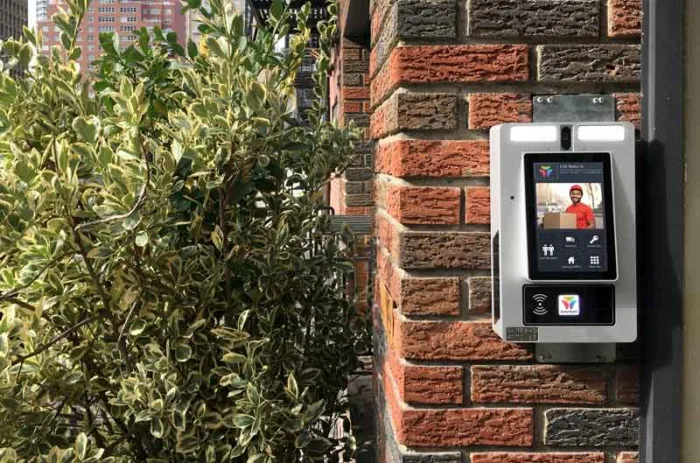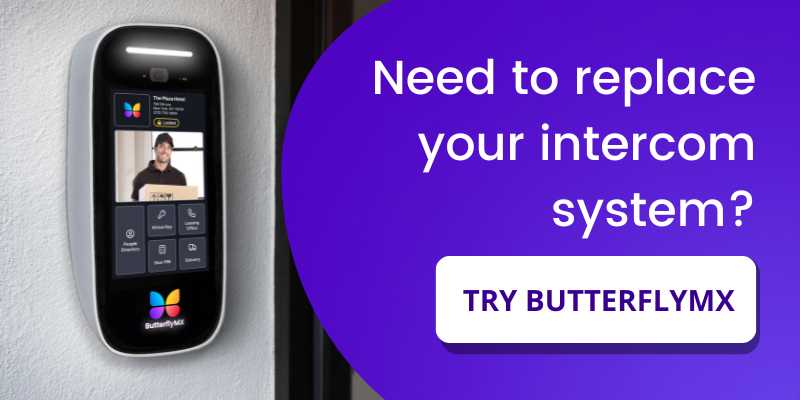Key takeaways:
- NYC’s intercom law requires Class A residential buildings with 8+ units, built or converted after 1968, to have an intercom system.
- Systems must allow voice communication between residents and visitors and enable remote door unlocking.
- Alternative options for non-smartphone users include princess phones or in-unit tablets with intercom functionality.

Disclaimer: This is not legal advice. We are not a lawyer or a law firm. This is our interpretation of the NYC Intercom Law. Please contact a licensed attorney if you need assistance interpreting this or other laws.
Owning or managing a property in New York City is complicated enough. You’re already spending time providing a great living experience for your residents — and if you’re looking for an installer in NYC to upgrade or replace your apartment intercom system, the last thing you need is to get bogged down in NYC’s apartment regulations. You have much on your plate without worrying about getting caught up in legal technicalities.
In this guide to the NYC intercom law, we’ll summarize the city’s laws regarding apartment intercoms. Then, we’ll explain how to comply with these laws and meet legal requirements with ButterflyMX’s video intercom system.
This post covers:
What is the NYC intercom law?
According to the NYC intercom law, your apartment building needs an intercom if it was built or converted for residential use after January 1st, 1968, and contains eight or more apartments. Under those conditions, you’re legally required to install an intercom. NYC intercom law outlines the functions an intercom must perform as well. Intercoms must allow apartment residents to communicate with guests from inside their apartments. Also, residents must be able to use intercoms to unlock the building’s main entryway and allow guests to enter.
Below is a section of N.Y. Multiple Dwelling Law § 50-a explaining which types of buildings need intercom systems:
“Every class A multiple dwelling erected or converted after January first, nineteen hundred sixty-eight containing eight or more apartments shall also be equipped with an intercommunication system. Such intercommunication system shall be located at an automatic self-locking door giving public access to the main entrance hall or lobby of said multiple dwelling and shall consist of a device or devices for voice communication between the occupant of each apartment and a person outside said door to the main entrance hall or lobby and to permit such apartment occupant to release the locking mechanism of said door from the apartment.”
Which buildings in NYC need an intercom?
You need to install an intercom if:
- Your building is classified as a “Class A” multiple dwelling, which is the designation for dwellings that residents permanently occupy.
- The building was constructed or converted into an apartment for residential use after January 1, 1968.
- Your building contains eight or more apartments.
You must install an intercom if your building meets all three of these conditions.
How does New York City law define an intercom?
If your building qualifies for an intercom, you’ll have to install a system that meets the city’s requirements.
Under NYC law, an intercom must:
- Be able to unlock a self-locking door.
- Have one device a resident can use to communicate with guests and release the door’s locking mechanism.
- Have another device stationed outside of a main entrance hall or lobby that guests can use to communicate with residents.
Watch how ButterflyMX works:
Does ButterflyMX comply with NYC intercom laws?
Yes, we believe ButterflyMX intercoms comply with NYC intercom laws and the tenant data privacy act; however, we recommend contacting a licensed real estate attorney in New York City to confirm that you’re in compliance before proceeding with the purchase and installation of our intercom.
ButterflyMX intercoms are at the forefront of property technology. Residents and property managers can count on ButterflyMX to provide cutting-edge features that make life easier.
Residents can use their smartphones to open doors and grant guests access—whether they’re at home or halfway around the world. Tenants can also send out Visitor Passes that allow their recipients to enter at specific times or days.
For managers, ButterflyMX makes property administration easier with a web-based operating system that displays an audit trail of all door release events and software that automatically updates its directory as residents move in and out.
Let’s take another quick look at what the law says an intercom has to do and compare these requirements with ButterflyMX intercom specs.
| Requirement | ButterflyMX |
|---|---|
| Does ButterflyMX allow for voice communication? | Yes |
| Does ButterflyMX allow for communication between residents and a person outside a main entrance hall or lobby? | Yes |
| Does ButterflyMX permit a resident to release a door-locking mechanism from inside their apartment? | Yes |
Accommodations for ButterflyMX users without smartphones
The ButterflyMX intercom works for all residents, whether they have a smartphone or not. If some tenants don’t have a smartphone, they can still use ButterflyMX.
If you want to supplement your ButterflyMX intercom with in-unit hardware, we have some suggestions:
Princess phone
A princess phone is a traditional, corded telephone with a keypad. The ButterflyMX intercom makes a regular telephone call to whatever phone number is programmed into it (landline or cell phone). The resident then presses ‘9’ to open the door for their guest.
Princess phones interact with ButterflyMX hardware by using SIP protocols, a set of rules that transfer phone call data over an internet connection. While princess phones are cheap to install and maintain, residents with princess phones can’t fully take advantage of ButterflyMX’s features and functionality. For example, they won’t be able to video chat with guests or send Visitor Passes.
In-unit tablet
If you want to allow your residents without smartphones to take advantage of all of ButterflyMX’s features, in-unit tablets are a great option. Unlike princess phones, tablets can leverage all of ButterflyMX’s potential — you can purchase any Android or Apple tablet, which can then be installed inside each apartment unit.
These tablets can be set up so tenants can only use them to access the ButterflyMX app. Generally, tablets are secure, easier to mount, and easier to wire into your building.
Mounting tablets on a wall will provide residents with a sleek, tech-forward living space. Your tenants can then talk with visitors and grant access through the ButterflyMX mobile app. They’ll also be able to access other features, like Visitor Passes and Delivery Passes.
NYC intercom law takeaways
- In New York City, you only need to install an intercom if your building is classified as a “Class A” multiple dwelling constructed or converted into apartment use after January 1, 1968, and if your building contains eight or more apartments.
- To comply with the law, your intercom must allow for communication between visitors and residents.
- If you want to install in-unit hardware, you can use Princess phones or in-unit tablets.
- If you choose in-unit tablets, you can purchase Android or Apple tablets and install the ButterflyMX mobile app.
- ButterflyMX meets the NYC intercom law by allowing residents to use their telephone, smartphone, or another device to unlock the door for visitors.
Now that you understand the legal side, you’re ready to install or replace your building’s intercom system—and give your property’s residents, staff, and visitors various useful features by choosing a ButterflyMX video intercom.







